The Furnace Market is estimated to be valued at USD 18.1 billion in 2025 and is projected to reach USD 30.3 billion by 2035, registering a compound annual growth rate (CAGR) of 5.3% over the forecast period. Growth momentum is seen as strongest at the beginning of the forecast period, with a 7.8 percent jump in 2025, before normalizing into the 5 percent range through subsequent years. Rising installations across industrial processing, commercial heating, and residential retrofitting have been instrumental in building this trajectory. The absolute dollar expansion continues to widen each year, reinforcing the expectation that structural demand drivers will secure consistent year-on-year gains during the forecast period.
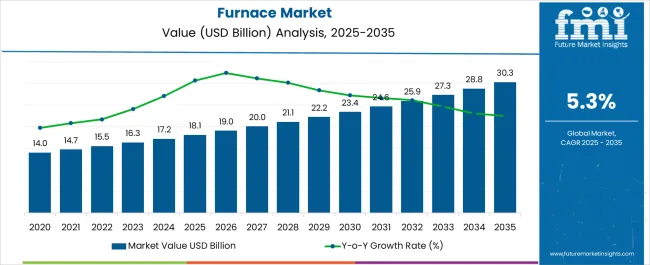
| Metric | Value |
|---|---|
| Furnace Market Estimated Value in (2025 E) | USD 18.1 billion |
| Furnace Market Forecast Value in (2035 F) | USD 30.3 billion |
| Forecast CAGR (2025 to 2035) | 5.3% |
The furnace market is experiencing steady demand growth, supported by rising urbanization, increasing energy efficiency standards, and the ongoing replacement of outdated heating systems. Technological innovations such as smart thermostats, variable speed motors, and advanced heat exchangers have significantly improved performance while reducing energy consumption.
These advancements align with both consumer demand for cost-effective heating solutions and governmental directives for lowering carbon footprints. Adoption is further reinforced by residential and commercial retrofitting initiatives, particularly across colder regions and aging housing infrastructures.
With continued investment in sustainable heating technologies and energy-efficient appliances, the furnace market is expected to sustain a stable growth trajectory over the coming years, driven by replacement demand and infrastructure modernization.
The furnace market is segmented by application, fuel, capacity, temperature, and geographic regions. By application, the furnace market is divided into Residential, Commercial, and Industrial. In terms of fuel, the furnace market is classified into Electric, Gas, Oil, and Others. Based on capacity, the furnace market is segmented into Small, Medium, and Large. By temperature, the furnace market is segmented into Low, Medium, and High. Regionally, the furnace industry is classified into North America, Latin America, Western Europe, Eastern Europe, Balkan & Baltic Countries, Russia & Belarus, Central Asia, East Asia, South Asia & Pacific, and the Middle East & Africa.
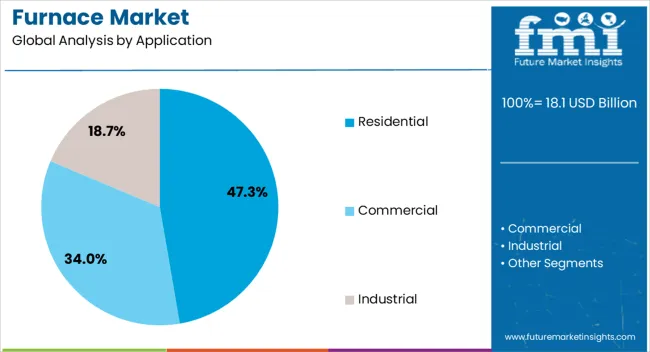
The residential segment is projected to hold 47.30% of total market revenue by 2025, making it the leading application category. This is due to the high volume of household heating requirements and growing emphasis on comfort, indoor air quality, and energy savings.
Increased construction of single and multi-family housing units, along with home renovation trends, has accelerated the adoption of modern furnaces. Rising consumer awareness regarding energy bills and environmental impact is also influencing the shift toward high-efficiency models in the residential space.
As a result, the residential sector continues to dominate furnace adoption based on consistent end user demand and large scale application scope.
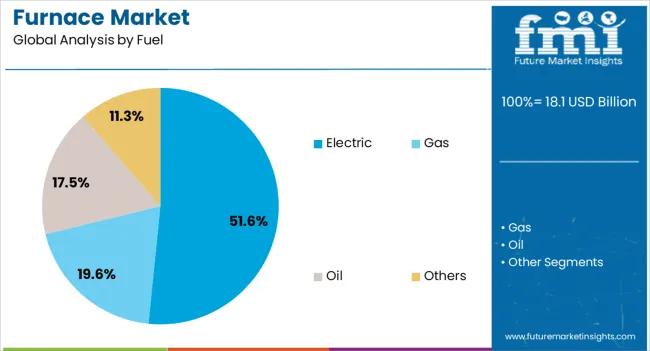
The electric segment is expected to contribute 51.60% of total market revenue by 2025 within the fuel category, establishing itself as the largest segment. This leadership is driven by lower maintenance requirements, operational safety, and compatibility with renewable energy sources.
Electric furnaces are increasingly favored in areas with stable electricity supply and in regions where gas infrastructure is limited. Their ability to integrate with solar power and smart energy systems has also made them more attractive in environmentally conscious markets.
As governments and consumers aim to reduce fossil fuel dependency, electric furnaces are gaining significant traction across both new installations and replacement cycles.
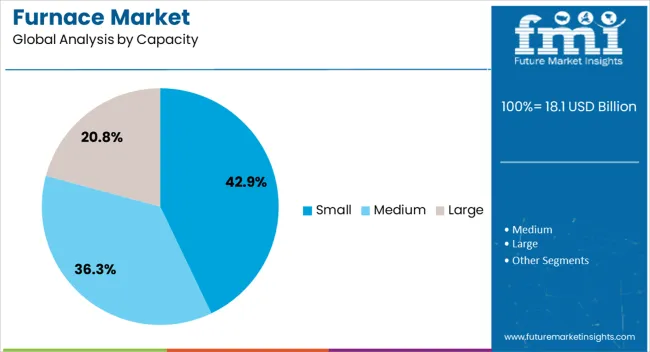
The small capacity segment is projected to represent 42.90% of total market revenue by 2025 under the capacity category, positioning it as the dominant segment. This is supported by its suitability for compact spaces, single-family homes, and apartments where heating load requirements are moderate.
Manufacturers are offering compact, energy-efficient units that cater to urban dwellings and modular housing structures. These systems are cost-effective, easier to install, and align with the design constraints of smaller residential and commercial properties.
The preference for space-saving solutions and lower upfront investment has reinforced the leadership of small-capacity furnaces in the market.
The furnace market is driven by increasing industrial demand, energy efficiency needs, and advancements in manufacturing processes. While challenges remain, including cost and regulatory pressures, growth opportunities lie in specialized applications and cleaner technologies.
The furnace market is primarily driven by increasing demand across industries such as metalworking, ceramics, and energy. As industrial production volumes rise, the need for high-efficiency furnaces to support various heat treatment processes grows. Furnaces are essential in applications like metal melting, heat treating, and forging. Demand for more energy-efficient solutions to meet operational costs is also a key driver, as industries increasingly seek ways to reduce energy consumption while maintaining high performance. As industrial output expands globally, particularly in emerging economies, the demand for furnaces across manufacturing and power generation sectors continues to increase, driving market growth.
Despite growth opportunities, the furnace market faces challenges related to high initial investment costs and operational expenses. The complexity of furnace systems, including their installation and maintenance, increases costs for manufacturers and end-users. Stringent environmental regulations also place pressure on furnace manufacturers to design systems that minimize emissions and adhere to energy consumption standards. The requirement for high-quality raw materials to build durable and efficient furnaces further adds to production costs. In addition, the rapid shift towards electric and hybrid furnace technologies requires manufacturers to adapt quickly and incorporate these technologies into their product lines, which can be resource-intensive.
Opportunities in the furnace market are emerging through increased demand for specialized furnace applications in industries like renewable energy, waste-to-energy plants, and the automotive sector. The push for advanced materials processing, such as high-temperature and high-pressure environments, opens new avenues for furnace manufacturers. Additionally, the expanding adoption of induction and electric furnaces offers manufacturers the chance to capitalize on clean and energy-efficient heating solutions. The growing use of furnaces in additive manufacturing and 3D printing also presents a new market segment. As industries evolve and diversify, these new applications will require furnaces with precise temperature controls and faster heating capabilities.
The future of the furnace market looks promising, as industries continue to invest in more efficient and versatile heating solutions. With increasing industrial output and demand for energy-efficient heating systems, furnaces are expected to remain integral to manufacturing processes. The development of next-generation furnaces that reduce energy consumption, improve temperature regulation, and minimize environmental impact will continue to drive growth in the market. Additionally, with the rise in industrial automation, the need for advanced control systems in furnaces will grow. As global production in sectors such as steel, chemicals, and automotive increases, the furnace market will continue to evolve to meet diverse industrial needs.
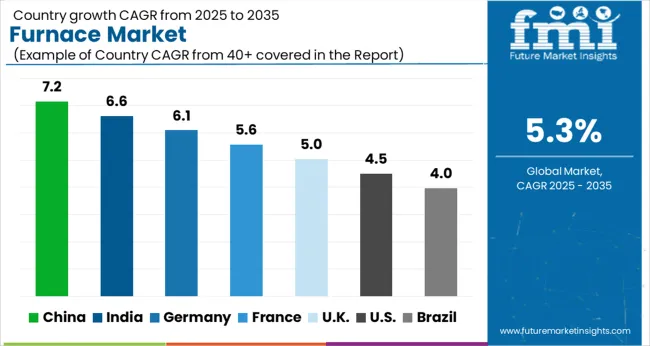
| Country | CAGR |
|---|---|
| China | 7.2% |
| India | 6.6% |
| Germany | 6.1% |
| France | 5.6% |
| UK | 5.0% |
| USA | 4.5% |
| Brazil | 4.0% |
The furnace market is projected to grow globally at a CAGR of 5.3% from 2025 to 2035, supported by the increasing need for energy-efficient heating systems in industrial processes. China leads with a CAGR of 7.2%, driven by robust industrial growth, the demand for high-capacity heating systems, and investments in energy-efficient technologies. India follows at 6.6%, supported by rapid industrialization, infrastructure projects, and increasing energy consumption in manufacturing.
France achieves a 5.6% growth, supported by the growing demand for efficient heating in industrial production. The United Kingdom achieves 5.0% growth, aided by the expansion of high-tech manufacturing and sustainable energy adoption. The United States posts a CAGR of 4.5%, as the demand for furnaces continues to grow in the energy and automotive sectors. This analysis covers over 40 countries, with these markets serving as key benchmarks for investment priorities, production strategies, and technology adoption in the global furnace industry..
China is projected to achieve a CAGR of 7.2% during 2025–2035, surpassing the global 5.3% average. The growth rate for the period 2020–2024 is estimated at 6.0%, driven by rapid industrialization, expanding manufacturing capacity, and a demand for energy-efficient furnaces.
The higher growth rate for the 2025–2035 period is expected from increasing investment in high-capacity furnaces for sectors like steel production, cement manufacturing, and energy generation. China’s focus on reducing emissions and improving energy efficiency will also drive the adoption of modern, high-performance furnaces. The shift toward cleaner energy and more advanced technologies will play a significant role in accelerating the growth of the furnace market in the country.
India is expected to post a CAGR of 6.6% during 2025–2035, higher than the global average. The market grew at a CAGR of 5.5% during 2020–2024, supported by robust industrial growth and increasing energy demand. India’s rising manufacturing sector, particularly in steel and aluminum production, is a major contributor to furnace demand. The shift towards more energy-efficient solutions to meet stricter environmental standards will propel growth in the coming years. With India’s push toward infrastructure development and industrial modernization, the furnace market is poised for strong growth, particularly in sectors like construction, chemicals, and power generation.
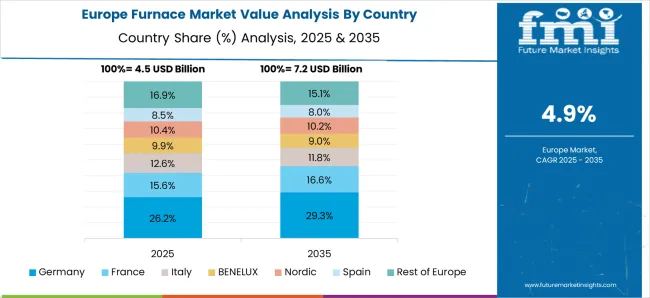
France is expected to grow at a CAGR of 5.6% during 2025–2035, slightly above the global 5.3% average. The market from 2020 to 2024 grew at a CAGR of 4.8%, supported by a steady demand for furnaces in metalworking, energy, and chemical industries. France's commitment to energy efficiency and carbon reduction targets is expected to drive the adoption of more sustainable furnace technologies in the future. The focus on reducing industrial emissions and improving operational efficiency in energy-intensive sectors will continue to fuel market growth. Furthermore, the growth of France’s renewable energy sector is anticipated to impact the demand for advanced furnace technologies.
The UK is projected to grow at a CAGR of 5.0% during 2025–2035, slightly below the global average. The market grew at a CAGR of 4.3% during 2020–2024, supported by steady demand from the construction and manufacturing sectors. The demand for energy-efficient and eco-friendly furnaces is rising, particularly as the UK continues to meet its environmental goals. The shift toward low-carbon and electric furnaces is expected to increase market growth, particularly in sectors like metalworking and power generation. The UK's focus on reducing industrial energy consumption and increasing sustainable manufacturing practices will contribute to the furnace market's growth over the coming years.
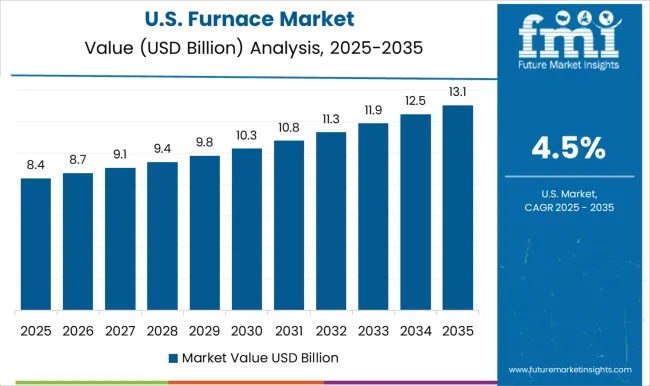
The USA is expected to grow at a CAGR of 4.5% during 2025–2035, slightly below the global 5.3% average. The market grew at a CAGR of 4.0% from 2020 to 2024, supported by steady demand from the energy, steel, and cement industries. The higher growth rate for the 2025–2035 period is anticipated due to the continued emphasis on improving energy efficiency in industrial operations and meeting stricter environmental standards. The USA market will benefit from innovations in industrial heating technologies, such as electric and hybrid furnaces, to reduce emissions and improve overall efficiency. The ongoing shift toward renewable energy sources also provides growth opportunities for the furnace market.
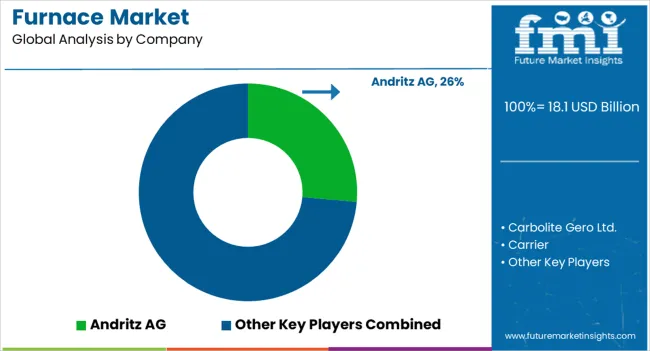
The furnace market is characterized by strong competition among key global players providing advanced heating solutions for industrial applications. Andritz AG is recognized for its energy-efficient furnace systems, focusing on applications in metallurgy, waste-to-energy, and chemical industries.
Carrier leads the way with innovative HVAC furnace technologies, offering both residential and industrial heating solutions with an emphasis on environmental control. CM Furnaces, Inc. is a significant player in the high-temperature furnace industry, specializing in systems for metal heat treatment and research labs. Daikin offers energy-efficient furnaces with smart technologies, focusing on environmental impact and ease of integration into building systems. Emerson integrates advanced controls and automation into furnace solutions, delivering precise temperature management across manufacturing sectors.
Entec Furnace stands out with customizable furnaces for a variety of thermal processing needs, ensuring optimized performance and energy consumption. Goodman Manufacturing Company focuses on residential and light commercial heating systems, offering cost-effective furnaces with superior energy efficiency.
IHI Machinery and Furnace Co., Ltd. provides robust furnace systems for the metal and glass industries, renowned for their durability and high-performance standards. Inductotherm specializes in electric furnaces for the metal industry, focusing on induction heating technology. Ipsen is a key supplier of vacuum and heat treatment furnaces used in aerospace, automotive, and medical device sectors. Johnson Controls leverages its deep industry experience to provide efficient, customizable furnaces for industrial and commercial markets. JR Furnace and Lennox focus on both residential and commercial applications, offering energy-efficient solutions.
Lucifer Furnaces specializes in high-precision electric furnaces for a variety of industrial processes. NIPPON STEEL ENGINEERING CO., LTD. offers state-of-the-art furnaces for steel and other metal industries, emphasizing energy efficiency and high output. Rheem Manufacturing delivers energy-efficient furnaces, focusing on residential HVAC systems. Technotherma Pvt. Ltd. is an emerging player specializing in custom furnace solutions tailored to specific industrial needs. The Grieve Corporation offers high-performance furnaces used across various industrial sectors. Trane Technologies offers highly energy-efficient and environmentally friendly furnace solutions for residential and commercial markets.
Competitive strategies in this market include material and process innovations, energy-efficient designs, and expanding product portfolios to cater to industrial and residential applications. Key manufacturers are focusing on integrating automation and control technologies to enhance furnace performance and energy management. Partnerships with OEMs for co-development and regional production hubs are also a focus to meet local market needs and reduce lead times.
| Item | Value |
|---|---|
| Quantitative Units | USD 18.1 Billion |
| Application | Residential, Commercial, and Industrial |
| Fuel | Electric, Gas, Oil, and Others |
| Capacity | Small, Medium, and Large |
| Temperature | Low, Medium, and High |
| Regions Covered | North America, Europe, Asia-Pacific, Latin America, Middle East & Africa |
| Country Covered | United States, Canada, Germany, France, United Kingdom, China, Japan, India, Brazil, South Africa |
| Key Companies Profiled | Andritz AG, Carbolite Gero Ltd., Carrier, CM Furnaces, Inc., Daikin, Emerson, Entec Furnace, Goodman Manufacturing Company, IHI Machinery and Furnace Co., Ltd., Inductotherm, Ipsen, Johnson Controls, JR Furnace, Lennox, Lucifer Furnaces, NIPPON STEEL ENGINEERING CO., LTD., Rheem Manufacturing, Technotherma Pvt. Ltd, The Grieve Corporation, and Trane Technologies |
| Additional Attributes | Dollar sales, market share by product type (e.g., electric, gas, industrial), and key applications (e.g., metalworking, energy). |
The global furnace market is estimated to be valued at USD 18.1 billion in 2025.
The market size for the furnace market is projected to reach USD 30.3 billion by 2035.
The furnace market is expected to grow at a 5.3% CAGR between 2025 and 2035.
The key product types in furnace market are residential, commercial and industrial.
In terms of fuel, electric segment to command 51.6% share in the furnace market in 2025.






Our Research Products

The "Full Research Suite" delivers actionable market intel, deep dives on markets or technologies, so clients act faster, cut risk, and unlock growth.

The Leaderboard benchmarks and ranks top vendors, classifying them as Established Leaders, Leading Challengers, or Disruptors & Challengers.

Locates where complements amplify value and substitutes erode it, forecasting net impact by horizon

We deliver granular, decision-grade intel: market sizing, 5-year forecasts, pricing, adoption, usage, revenue, and operational KPIs—plus competitor tracking, regulation, and value chains—across 60 countries broadly.

Spot the shifts before they hit your P&L. We track inflection points, adoption curves, pricing moves, and ecosystem plays to show where demand is heading, why it is changing, and what to do next across high-growth markets and disruptive tech

Real-time reads of user behavior. We track shifting priorities, perceptions of today’s and next-gen services, and provider experience, then pace how fast tech moves from trial to adoption, blending buyer, consumer, and channel inputs with social signals (#WhySwitch, #UX).

Partner with our analyst team to build a custom report designed around your business priorities. From analysing market trends to assessing competitors or crafting bespoke datasets, we tailor insights to your needs.
Supplier Intelligence
Discovery & Profiling
Capacity & Footprint
Performance & Risk
Compliance & Governance
Commercial Readiness
Who Supplies Whom
Scorecards & Shortlists
Playbooks & Docs
Category Intelligence
Definition & Scope
Demand & Use Cases
Cost Drivers
Market Structure
Supply Chain Map
Trade & Policy
Operating Norms
Deliverables
Buyer Intelligence
Account Basics
Spend & Scope
Procurement Model
Vendor Requirements
Terms & Policies
Entry Strategy
Pain Points & Triggers
Outputs
Pricing Analysis
Benchmarks
Trends
Should-Cost
Indexation
Landed Cost
Commercial Terms
Deliverables
Brand Analysis
Positioning & Value Prop
Share & Presence
Customer Evidence
Go-to-Market
Digital & Reputation
Compliance & Trust
KPIs & Gaps
Outputs
Full Research Suite comprises of:
Market outlook & trends analysis
Interviews & case studies
Strategic recommendations
Vendor profiles & capabilities analysis
5-year forecasts
8 regions and 60+ country-level data splits
Market segment data splits
12 months of continuous data updates
DELIVERED AS:
PDF EXCEL ONLINE
Furnace Wall Sootblower Market Size and Share Forecast Outlook 2025 to 2035
Vertical Furnace Tube Cleaning Machine Market Size and Share Forecast Outlook 2025 to 2035
Induction Furnace Market Size and Share Forecast Outlook 2025 to 2035
Industrial Furnace Industry Analysis in Europe Forecast and Outlook 2025 to 2035
Industrial Furnace Market Size and Share Forecast Outlook 2025 to 2035
Laboratory Furnaces Market Analysis - Size, Share, and Forecast 2025 to 2035
Submerged ARC Furnaces Market Size and Share Forecast Outlook 2025 to 2035
Anode Refining Furnace Market Size and Share Forecast Outlook 2025 to 2035
Preheating Tunnel Furnace for Lithium Battery Market Size and Share Forecast Outlook 2025 to 2035
Atmosphere Roller Furnace Market Size and Share Forecast Outlook 2025 to 2035
Demand for Vertical Furnace Tube Cleaning Machine in USA Size and Share Forecast Outlook 2025 to 2035
Quantitative Casting Furnace Market Size and Share Forecast Outlook 2025 to 2035
Biomass Hot Air Generator Furnace Market Size and Share Forecast Outlook 2025 to 2035
Demand for Biomass Hot Air Generator Furnace in Middle East & Africa Size and Share Forecast Outlook 2025 to 2035
Industrial High-Temperature Graphitization Furnaces Market Size and Share Forecast Outlook 2025 to 2035

Thank you!
You will receive an email from our Business Development Manager. Please be sure to check your SPAM/JUNK folder too.
Chat With
MaRIA